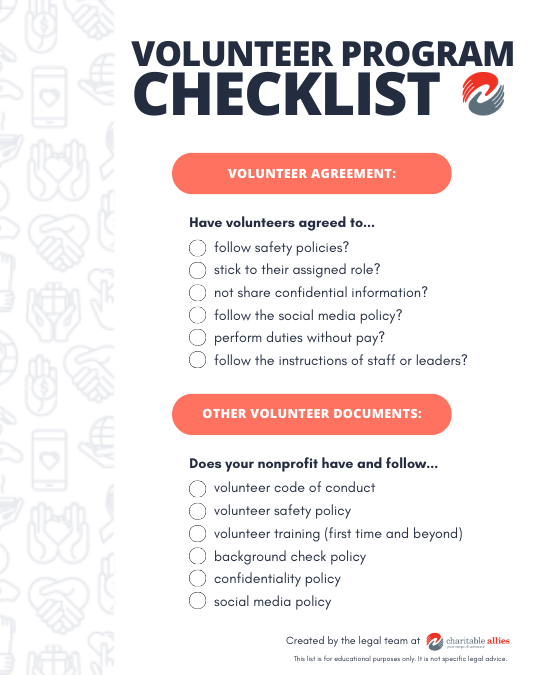
Volunteers are the backbone of many nonprofit organizations. They give their time, energy, and passion to causes they believe in. But while they’re selfless, the legal realities surrounding volunteers are anything but simple. As a nonprofit leader, you need to make sure your volunteer program is both legally sound and aligned with your mission. Documents like a volunteer agreement, a code of conduct, or safety policies can give your nonprofit the protections it needs. Let’s break down the essential documents and policies that you need to keep your volunteers safe, compliant, and empowered.
1. Volunteer Agreement: Why You Need One
A volunteer agreement isn’t just a piece of paper; it’s a safeguard for your nonprofit and your volunteers. Ideally, it should clearly outline expectations, responsibilities, and legal protections for both parties. This document sets the tone for your volunteer relationship, ensuring there is a clear understanding of all parties’ rights and responsibilities. It is important to understand that this is different from just the volunteer policies. Policies communicate the rules, while agreements communicate the roles and obligations. Agreements are the documents that staff or volunteers sign to acknowledge and agree to these policies. Or, depending on the project, it may be a release of liability or a commitment to a certain task. Having volunteers sign an agreement will protect your nonprofit from liability in the event something goes wrong with a volunteer.
Key elements to include in your volunteer agreement:
- Acknowledgment of Volunteer Status: Volunteers should confirm they are not expecting compensation and are volunteering purely for philanthropic reasons.
- Compliance with Policies: Volunteers must agree to follow your nonprofit’s policies and procedures, including training requirements.
- Liability and Safety: Protect your nonprofit by having volunteers acknowledge their responsibility for their own actions and potential liabilities.
- Confidentiality: If your volunteers handle sensitive information, like donor data, make sure they understand the importance of keeping it confidential.
A solid volunteer agreement sets expectations and shields your organization from potential legal issues. Something we’ve advised on recently is social media policies for volunteers. It’s common for volunteers to want to take photos and share them online. But what if your volunteers are handling sensitive information or working with a population that has strict regulations surrounding social media (like foster children)?. If you do not communicate these rules to a volunteer and they make a mistake, the responsibility lies on your nonprofit. Depending on the issue, the consequences could be loss of trust with a donor all the way to legal action, financial penalties or even loss of licensure for nonprofits working in a more regulated field like mental or physical health. It is your responsibility as an organization to inform the volunteers of rules, which is why a properly written volunteer agreement is so important.
2. Volunteer Code of Conduct
A volunteer code of conduct is your nonprofit’s values distilled into simple, actionable guidelines. It’s not just about rules; it’s about fostering the right culture. This document sets the standard for how your volunteers interact with each other, your staff, and the people you serve.
Here’s are a few sections you might want to include in your volunteer code of conduct:
- Expected Behavior: To lower your liability and keep the program safe and positive, it is important to lay out the rules on how volunteers must behave. This means no harassment, discrimination, or physical violence.
- Confidentiality: Any personal or sensitive information volunteers come across—whether about clients, donors, or internal operations—must be kept private. A simple rule: If it’s not yours to share, don’t.
- Reliability and Commitment: If a volunteer signs up for a shift, they need to show up. A policy on attendance and notifying staff about absences ensures operations run smoothly.
- Safety and Compliance: Whether it’s following emergency protocols, handling food safely, or adhering to background check requirements, every volunteer must commit to maintaining a secure environment.
- Consequences for Violations: Clearly outline what happens if a volunteer doesn’t follow the code—warnings, retraining, or, in severe cases, dismissal. A structured process ensures fairness and consistency.
A good volunteer code of conduct doesn’t have to be overly complicated. Keep it clear, concise, and aligned with your values. Don’t skip this step—it can save you from major headaches down the road.
3. Volunteer Safety Policies and Training
The safety of your volunteers, staff, and the individuals you serve is paramount. Clear volunteer safety policies ensure that everyone knows the rules when it comes to risky situations, and that your nonprofit is protected legally.
For example, if volunteers will be working with vulnerable populations—like children, the elderly, or individuals with disabilities—you need a robust safety framework in place. This might include:
- Background Checks: Certain volunteers, especially those interacting with children or handling sensitive data, should undergo thorough background screenings. A quick scan of a volunteer’s criminal history, driving record, or sex offender registry could save your nonprofit from safety disasters or expensive lawsuits. You can read more about when to background check volunteers here.
- Training: Volunteers should be properly trained in safety protocols, including handling emergencies, reporting abuse, or simply knowing when to escalate a situation to staff.
- Liability Insurance: Most states don’t provide workers’ comp for volunteers, so it’s critical to look into separate insurance coverage to protect your organization from accidents.
Let’s face it, volunteer safety isn’t something you can afford to skip. Not only does it protect your organization, but it also fosters a sense of trust with your volunteers and those you serve.
4. Legal Considerations: Protecting your organization and volunteers
Here’s the thing—volunteer management isn’t just about rules and contracts. It’s about creating an environment of trust and transparency. You’re not just asking volunteers to show up; you’re asking them to embody the values and mission of your nonprofit. When people see and interact with your volunteers, their interaction will color how they see the organization as a whole, which can impact their likelihood to support and donate to your organization. Proper volunteer management protects volunteers, staff and clients. It also protects your organization from issues like expensive lawsuits that drag time and money away from your mission.
Consider this a reminder: Volunteers aren’t employees, so don’t treat them like one. You can’t offer them stipends or gifts that would classify them as workers under labor laws. That said, small gestures like thank-you notes or buying pizza for everyone when they volunteer at a mealtime are perfectly fine.
Things to consider when you’re developing or improving your volunteer program
- Fair Credit Reporting Act (FCRA): If you’re conducting background checks, make sure you’re following proper procedures—get consent and follow the same procedure for everyone.
- Workers’ Compensation: Many states don’t cover volunteers under workers’ comp. If they get hurt during their time with your nonprofit, you might be on the hook for medical bills. This is where insurance comes in. Look through your insurance policies, especially the liability or umbrella policies, to see if volunteers are covered or if you’ll need additional coverage.
- Good Samaritan Laws: Volunteers are generally protected from legal liability when they act in good faith and follow the rules of their specific role. But from an ethical perspective, you still want to do all you can to ensure less liability and potential for mishaps. Regularly training volunteers properly is a huge piece of this. Bonus points if you have materials volunteers can refer back to if they are unsure of their role in a certain situation or forgot pieces of the training.
5. Next Steps: Building a Strong Volunteer Program
Now that you have a sense of the key documents and policies needed for volunteer safety and legal compliance, it’s time to take action. Here’s your to-do list:

Volunteers are essential to your nonprofit’s success, but they also bring legal responsibilities that you can’t afford to ignore. Having clear, well-structured documents and policies, like a volunteer agreement or volunteer safety policies, isn’t just a legal requirement—it’s a key component of your nonprofit’s long-term success. After all, the last thing you want is to have a major volunteer-related issue derail the amazing work you’re doing to make a difference.
Take the time now to ensure your volunteer program is strong, safe, and legally compliant. If you’re unsure where to start, reach out to consult our legal team. We can help you build a program that protects your mission and empowers your volunteers to do what they do best—make an impact.

